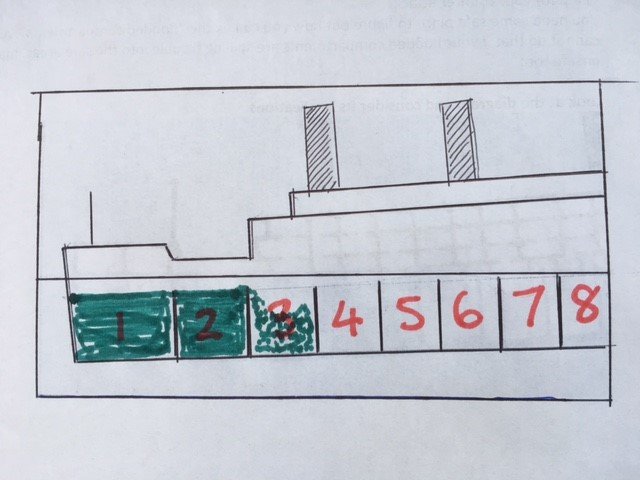Coping With Stress
Coping With Stress
It is important to learn how to handle stress, because you cannot avoid all stressful situations.
You can handle stress by compartmentalising your mind and by breaking your experience into clear, distinct and separate compartments.
Your mind can be likened to a ship, that is sailing on the seas of life.
- Sometimes the going is good and the winds are in your favour; the sea is calm and the weather is fine and sunny. Life seems to be all plain sailing.
- Other times the going is NOT so good. The winds are against you, the sea is rough and the weather is stormy. Life seems to be stressful, stormy and dangerous.
Sometimes, as you know, ships encounter dangerous, giant icebergs.
In 1911, The Titanic famously hit an iceberg and sea-water flooded into the body of the ship.
Nobody knew that the Titanic had a fatal flaw in its design, in that it did not have fully water-tight bulkheads. Consequently, water flooded from one compartment to the next, to the next, to the next. Each compartment flooded, and then fed sea-water to the adjoining compartment until the whole ship was lost, and it sank.
Think of the construction of a ship. Since that time, all ships have built, within their structure, a number of fully water-tight bulkheads. These watertight bulkheads prevent sea-water flowing from one compartment into the next; so flooding the whole ship.
Your mind should have the same set up. Your mind can be likened to a ship, that can either have water tight bulkheads, or not.

Most people's minds do not have watertight bulkheads, so that any problem in one area of the person's life soon overflows into the other adjoining compartments and causes the whole ship to flounder and then sink.
Example: George has a problem at work, and the work problem ends up with a big argument between George and his boss, Alison. George goes home worried about the work-related problem and is annoyed with Alison.
When he gets home he is irritable with his partner. He feels argumentative and short tempered and complains that he does not like the dinner she has prepared. They have an argument. George says things he should not say.
He leaves the house and goes out for a drink with a friend. He drinks too much. He gets drunk. He falls over on the way home and severely twists his ankle. Now he cannot walk. He makes his way to the hospital A & E and spends the night waiting to be seen. He limps home at 2am.
When he gets home he has another row with his wife. George sleeps in the spare room. He oversleeps and wakes up at 9.30am. He calls in sick. His boss is suspicious about his "sickness" and they have another row. George puts the phone down and says, "Why does everything happen to me!"
Everything seems to happen to George because he failed to compartmentalise his problems. He allowed the work-problem to flow into an argument with his boss, which then flowed into an argument with his partner, which then led him into drinking too much, which flowed into an ankle injury, which then flowed into a late arrival home, which led to another argument, which led to oversleeping, which led to work absence; which led to another argument.
Poor George allowed the first event to be the trigger for a Titanic-type disaster: Trouble in one compartment flooded the next and so on until the whole ship sinks.
What is the solution?
The solution is to have water tight compartments built into your brain. If there is trouble in one compartment, DO NOT allow that to overflow into the next compartment.
Instead, separate your life into sections and keep them isolated. So, if one thing goes bad, it goes bad on its own. You retreat to the safe zones. You protect the safe zones and keep them sacrosanct, for example:
- If there is trouble at work, DON'T take it home and use that as a reason to be harsh to the family.
- If there is trouble at home, DON'T take it to work and use it as an excuse to be harsh to people at work.
- If there is trouble at work AND at home, DON'T use that as an excuse to abuse your health by drinking too much alcohol.
Instead, if there is trouble at home and at work, then use the gym as your sanctuary and make yourself as strong and powerful as you can be.
The non-affected areas of your life need to be kept away from the affected areas and used as a base-camp for your counter attack.
You need a safe place to figure out how you can fix the "flooded compartments". And you cannot do that if your flooded compartments are spilling trouble into the safe areas, making them unsafe too.
Look at this diagram and consider its implications.

Definition: mental compartmentalisation
Mental compartmentalisation is a stress-management technique where you split your life into clear, separate mental rooms. Each room holds one area such as work, home or health. Strong inner walls stop feelings from leaking between rooms, so one bad event stays contained. Daily practice of this skill keeps focus and protects calm.
Show CG4D Definition
- Deliberately divides life into distinct mental areas
- Prevents thoughts and feelings moving across those areas
- Needs conscious boundary setting and regular practice
- Reduces overall stress by keeping problems contained
Article Summary
Handle stress by giving each part of your life its own safe room. When trouble hits work, shut that door, stay calm, and protect your home, health and friends. This simple habit stops one bad wave from soaking all you value, so you stay steady and ready to act.
Frequently Asked Questions
Here are some questions that frequently get asked about this topic during our training sessions.
What does it mean to compartmentalise my mind when I feel stressed?
How does the ship and bulkhead metaphor help me handle stress?
Why should I keep safe zones for stress during a busy week?
Can mental compartmentalisation prevent burnout at work?
What first step helps me stop stress spillover from work to home?
Are healthy stress outlets like the gym really effective?
How can I build emotional resilience using these stress coping techniques?
Thought of something that's not been answered?
Did You Know: Key Statistics
The UK Health and Safety Executive states that work-related stress, depression or anxiety caused 49% of all working days lost in 2023. A 2022 meta-analysis in the Journal of Occupational Health Psychology finds that employees who mentally detach from work outside office hours are 26% less likely to suffer burnout.Blogs by Email
Do you want to receive an email whenever we post a new blog? The blogs contain article 5-10 minutes long - ideal for reading during your coffee break!
Further Reading in Stress Management
-
Stress Management or Time Management? Discover What You Really Need
Feeling overwhelmed at work? Learn how prioritising tasks, avoiding procrastination and sharpening time management turns stress management into daily habits.
Read Article > -
How to Handle Stress
Learn how managing stress the smart way turns pressure into strength. Discover good stress, warning signs of burnout, and simple push-rest habits for growth.
Read Article > -
The Eight Minute Holiday: Stress Management System
Use the 8-minute holiday method to cut stress fast at work. Simple breathing, mindfulness and body scan steps give calm, lift mood and boost focus each day.
Read Article > -
Coping With Stress
Learn to handle stress by dividing work, home and health into separate 'safe rooms'. Stop one setback from flooding your whole life and regain focus each day.
Read Article >
Looking for Leadership and Management Training?
If you're looking to develop your Stress Management Skills, you may find this Leadership and Management Training Course beneficial:
Open Training Course Pricing and Availability
Next Open Course Starts in 12 days, Cardiff, places available







